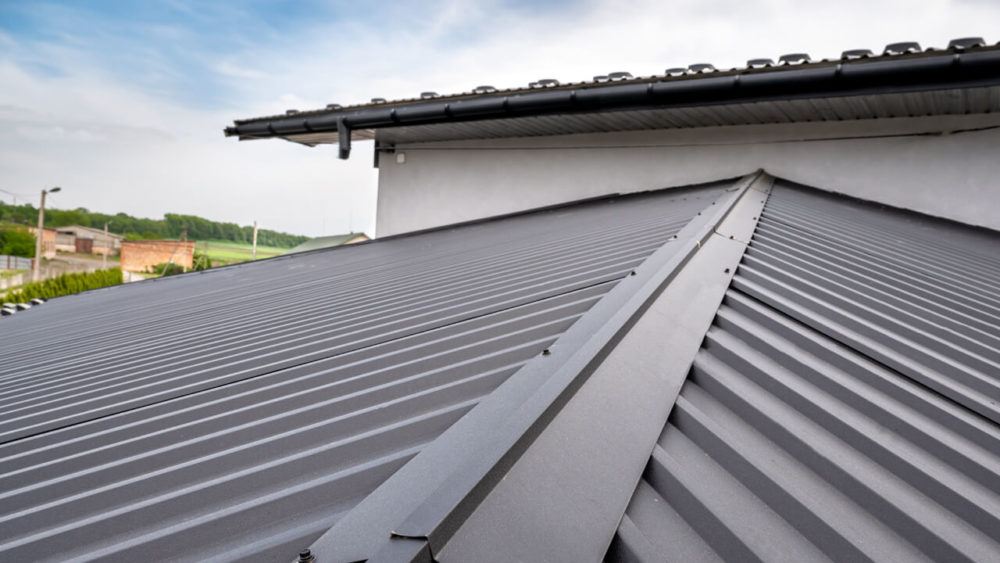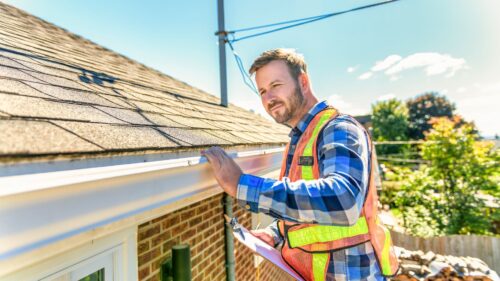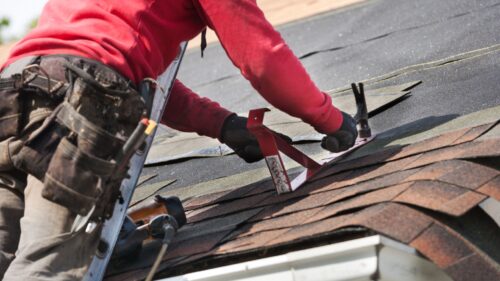If you’re looking to install a new roof, the price estimate can vary based on numerous factors. This includes the price per square foot, the specific material, and the total area of roofing your home requires.
On average, getting a metal roof installed by a professional roofing company will cost around $8,500. Usually, homeowners pay between $4,800 and $12,200 for metal roofing. This drastic variation in price is because the final quote will depend on the labor rate, style, and material, which impact the price.
Here’s what you’ll find on this page:
- Types of metal roofing
- Metal roof costs
- Comparisons
- Brands of metal roofing materials
- How to choose the best roofing company for the installation
- Frequently asked questions
Types of Metal Roofing
Before you can get an accurate quote as to how much it will cost to get a new roof professionally installed, you need to select a type of metal roofing. Some of the most common types of metal roofing available on the market include:
Aluminum Roofing
Aluminum roofs are lightweight and offer impressive longevity because of their resistance to environmental effects. This type of roof will preserve its appearance for long periods and does not fade easily. Typically, aluminum roofs can last for decades and since the metal is so ductile, you have various opportunities for design.
Corrugated Metal Roof
This is a suitable type of roof for applications such as commercial building envelopes, log cabins, and homes. Some of their best features include being an affordable, long-lasting, and energy-efficient roofing option. It also offers a good return on investment.
In this type, exposed fasteners hold corrugated sheet metal panels in place. Applications include factories, industries, commercial, residential, and barn roofs.
Metal Slate Roofs
As the name implies, this type of roofing comprises metal slates fastened together. It offers a variety of benefits to any home, like being resistant to different kinds of weather and offering some insulation properties as well.
It’s easy for rain and snow to dry and slide off a metal slate roof. Now that homeowners can choose from a wide variety of color options and styles, even metal slate roofs can mimic attractive features of other materials.
Steel Roofs
Steel roofing is an eco-friendly, attractive, and durable option, and they offer plenty of other advantages as well. For instance, they have fire-resistant qualities that help them insulate sparks and keep a fire from spreading through the home.
Steel roofing is highly recyclable and in many cases, contains recycled materials as well. Comparatively, other materials, such as asphalt, crowd up landfills. It’s lightweight and even provides savings when it comes to cooling and heating costs.
When it comes to maintenance costs, you’ll be saving plenty of money because steel roofs don’t warp, shrink, or crack because of environmental effects like sunlight or humidity.
Copper Roofing
A natural material, copper works as a material to cover roofs since medieval times. For centuries, large structures such as churches and buildings have had copper roofs, many of which are still intact.
Like other types of metal roofing, copper offers amazing durability you can expect it to last over fifty years. That is if you invest in proper maintenance and care. Nonetheless, copper roofing is resistant to environmental effects like high and low temperatures, so it doesn’t deteriorate as quickly.
Copper can be recycled, and like other types of metal roofing, it reflects heat and doesn’t absorb it, thereby allowing you to save on energy costs.
Metal Tile Roofing
A metal tile roof lightweight, durable, and easier to handle when compared to long corrugated metal sheets. It’s an affordable and reliable roofing option and works well with a variety of styles and designs. It’s easier to transport and has a low carbon footprint as well.
In this type of roofing, each tile attaches to battens in a horizontal pattern. This allows design opportunities and helps homeowners avoid any uplift issues that often occur due to strong winds. Metal tiles for this roofing comprise of fire-resistant materials that can prevent a fire from spreading across the home.
Standing Seam Metal Roofs
Among the different types of metal roofs available, a standing seam roof offers amazing durability, is low-maintenance, and can last very long. They are convenient to install, and in most cases, homeowners opt to get a standing seam roof installed over the current roofing.
Not to mention, you’ll benefit from its energy reducing features that serve as a return on your investment. This type of roofing is ideal for homes with many roof levels – it’s made using vertical panels. Each panel incorporates two seams to stand vertically. After installing the roof, it gives a dramatic appearance that highlights your roof’s different angles.
Tin Roofing
Just like with other types of metal roofing, tin roofing is an option for homeowners who want a roofing solution that offers savings and durability.
Costs for Metal Roofing Material
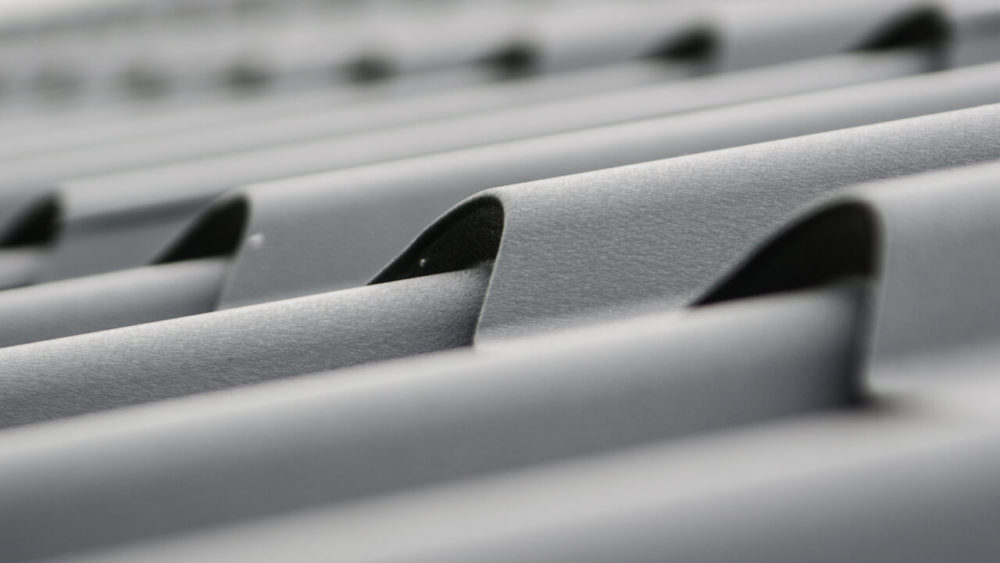
The term ‘metal roof’ is an umbrella term that refers to a variety of different types, which means a broad spectrum of roofing materials. As a result, prices can vary greatly based on the type of material you select.
Depending on what material you select for a metal roof, the price can range from $7 to $9 per square foot. Of course, there are options that cost slightly less, so they’re more affordable, such as steel panels. Likewise, high-end materials, like copper, cost a little more per square foot.
Let’s take a few examples of common metal roofs and their costs.
- For starters, a steel and aluminum shingle roofing will cost $3 to $9 per square foot. Although corrugated panels are far more affordable than metal roofing shingles and tiles, the latter still offers a good deal. They can last a long time and compared to corrugated panels, offer more protection from rust and leaks.
- The least expensive type of metal roofing uses corrugated steel panels and it costs around $1.20 to $5 per square foot, which is very low compared to the price of asphalt shingle roofing. Since it’s lightweight, property owners can have it installed over existing roofing, which reduces the cost of removing the old roof. Nevertheless, these panels are prone to rust and leaks.
- In terms of availability, standing seam metal roofing is very common and its costs can range from around $4 to $7 per square foot.
- One of the most expensive metal roofing options is copper-zinc metal roofs, which can cost anywhere from $4 to $15 per roofing square foot. This type is considered to have amazing quality when compared to others.
- One of the more aesthetically diverse types of metal roofing is stone coated steel tiles and shingles. These cost around $1.90 to $4 per square foot and combine the durability of metal roofing with the vintage appeal of slate or clay shingles.
Comparisons
If you’re still on the fence as to whether you should opt for asphalt shingles or metal roofing, let’s draw up some comparisons between the two.
Cost
On average, metal roofing will cost you $7 to $10 per square foot. Meanwhile, asphalt shingles cost $1.50 to $5.50 on average. When it comes to cost, you pay more if you opt for metal roofing.
Longevity
Based on the type of metal roofing you install, it will last around 40 to 80 years. On the other hand, an asphalt shingle roof will only make it past 20 years or so. In this round, metal roofing is definitely superior.
ROI
Based on the cost vs. longevity debate, and considering the various other advantages of metal roofing, you’ll make an average ROI of 86 percent. It also reduces your insurance rates because of how metal roofing is resistant to fire in comparison to asphalt shingle roofing.
Brands of Metal Roofing Materials
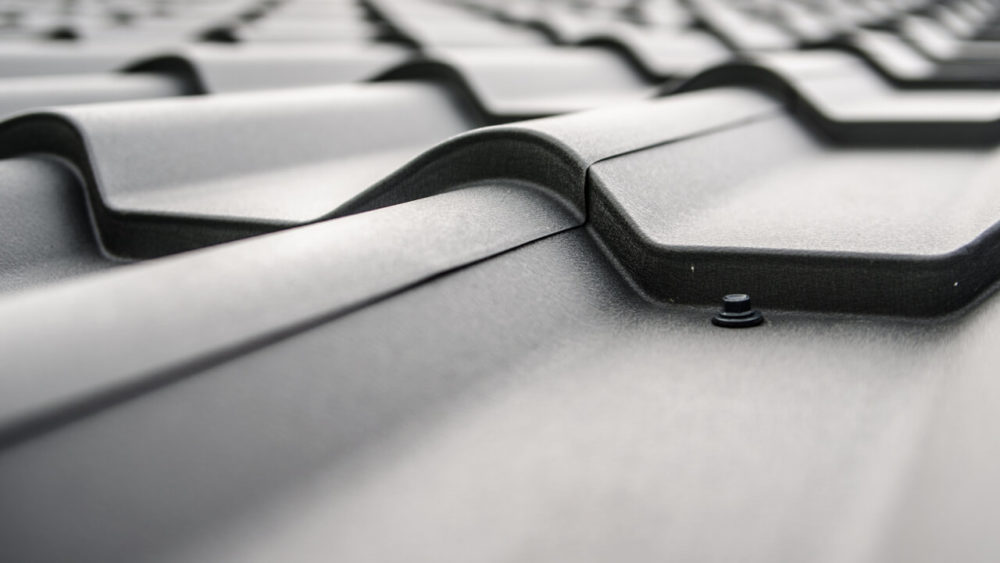
TAMKO Roofing Shingles
Based in Joplin, Missouri, TAMKO Building Products is known for their popular MetalWorks line of steel shingles. Their line provides metal roofing with the traditional appeal of wood, tile, and slate for residential and commercial roofs. This, combined with industry-grade G-90 steel gives the ideal mix of durability and style.
These tiles are suitable for reroofing applications, so homeowners can install them over a layer of asphalt shingles. In addition, they have a four-way locking system and are 100 percent recyclable.
They also offer them in a variety of aesthetically pleasing colors like Canyon Copper Bronze, Forest Green, and Vermont Blue. The best part? They’re ENERGY STAR® qualified!
Metal Pro Roofing
Metal Pro Roofing manufactures what they call ‘permanent roofing’ that outlasts asphalt shingles. It has a powder-coating finish that helps prevent shedding, cracking, and fading. They use 24 gauge steel for roofs because it’s durable enough to suit all sorts of rib panels.
Metal Pro Roofing includes ‘Batten System Technology’, which allows proper ventilation for better energy savings. The material is resistant to corrosion and harsh weather conditions as well.
INTERLOCK Metal Roofing Systems
The company behind ‘lifetime metal roofing systems’, INTERLOCK offers a variety of different roofing materials that mimic the look of traditional products. For instance, the Interlock® Slate roof provides the look of natural slate minus the weight, and the longevity of metal roofing. Unlike traditional slate, this variant is much lighter and doesn’t weigh as much.
Their other products include Cedar Shingles, Tiles, Standing Seam roofs, and solid copper. All of their products are aluminum roofing systems that not only increase your property’s curb appeal but are great for the environment as well.
McElroy Metal
A leading manufacturer of metal roofing systems, McElroy Metal offers homeowners and property owners with a vast variety of roofing material options. Their product lineup includes exposed and concealed fastener panels, standing seam systems, retrofit systems, and most importantly, stile and shingle roofing panels.
Their classic met-tile mimics the appearance of ceramic tiles but it’s lightweight, durable, and energy efficient. The Milan Steel Shingles come in different prints and colors so that homeowners can install roofs that align with their preferences and tastes.
Classic Metal Roofing Systems
Based in Piqua, Ohio, they’re a reliable manufacturer for residential metal roofing since the 1980s. Classic Metal Roofing Systems’ standing seam roofing, tiles, shakes, and shingles are made using 95 percent recycled aluminum. Homeowners can enjoy improved protection, enhanced curb appeal, and an environmentally friendly roofing system.
The Classic product lineup includes numerous styles such as Country Manor Shake (looks like wood shakes), Rustic Shingle (resembles wood grain), Grand Tile (mimics clay tile), Slate Rock Oxford (imitates architectural slate), and Clocklock Premium Standing Seam (gives the look of traditional standing seam). Other options include their Universal Standing Seam and Oxford Shingle.
Everlast Roofing, Inc
The company prides itself on being the ‘Next Generation of Metal Roofing’ because of its innovative practices that developed robust products. Their product lineup includes appealing and durable metal roofing products that require close to no maintenance, mainly three energy-saving profiles. Namely, these are the Everlast II, Everloc, and the Everseam.
The Everlast II gives a board and batten appearance and comes in different colors to accentuate the existing architecture. Aside from their charming appeal, the Everlast II panels interlock; this provides a wind-and-water-resistant seal.
The Everloc panels look just like traditional standing seam roofs. Hence, they provide the same stylish appeal minus the extra cost of seaming tools and labor. Due to their high-strength steel construction, you won’t have to worry about eroding, shrinking, or cracking.
The Everseam combines the durability of high-strength steel with the elegant look of traditional seam roofing. It’s resistant to the elements so you’ll have peace of mind in the long run.
EDCO Steel Roofs
EDCO’s line of products includes steel roofing, steel siding, and Soffit, Fascia, and Trim. In steel roofing, homeowners can choose from a range of different panels like the Arrowline Shake and Arrowline Slate.
The Arrowline Shake is environmentally friendly, noncombustible, and almost maintenance-free. When it comes down to features, it offers prime durability, and resistance from wind, mold, and impact. Not to mention, it’s available in 17 solid and enhanced colors like copper, charcoal gray blend, and pewter.
Arrowline Slate offers most of the same benefits, except it’s available in 11 colors and is a lightweight option. Other options include their Generations HD Steel Roofing and Infiniti Textured Steel Slate.
For Generations HD Steel Roofing, HD imaging is used to create steel cedar shakes with natural dimensions. Meanwhile, Infiniti Textured Steel Shakes are textured panels coated with thermal-fused particle technology. Thanks to this proprietary technology, they provide amazing performance and style.
Matterhorn Metal Roofing
The Matterhorn line of metal roofing is by CertainTeed, a leading manufacturer of products including residential roofing, siding, insulation, ceilings, decking, and much more. Matterhorn Metal Roofing is available in tile, shake, and slate.
These roofing systems combine the aesthetic appeal of traditional roofs with the protection of high-strength steel. Matterhorn Tile is available in many of the same colors as clay.
Matterhorn Shake roofing is designed with cracks and chiseling so that it has a similar appeal to real wood. The system includes eight separate elevation changes so it offers the same irregularity as traditional wood shakes.
Lastly, Matterhorn Slate roofing is rendered and crafted in steel to provide an energy efficient, recyclable, and lightweight alternative to the traditional roofing material. It’s available in colors such as Mountain Sage, Cobalt, and Brownstone to replicate the same hues. Moreover, their patented paint application creates the appearance of naturally mottled slate.
DECRA Roofing
The manufacturer’s stone coated steel roofing systems are available in options like shingle, shake, and tile. Amalgamations of traditional aesthetic and durability, the panels have a sturdy interlock mechanism that can withstand the elements and high winds.
The DECRA profiles include Shake XD, Shake, Shingle XD, Tile, and Villa Tile. The Shake XD reflects the design detail of rustic, hand-split wood shakes while the DECRA Shake provides the richness of cedar shake.
The DECRA Shingle XD has the same bold appearance of traditional architectural shingles minus the weight. The panels have thick cut edges and deep shadow lines to give better dimensionality.
DECRA Tile is made from stone coated steel but delivers the same style as Mediterranean Tile. It’s lightweight, durable, and offers impeccable performance. On the other hand, the DECRA Villa Tile displays similar detailing as old-world Italian tiles. Aside from being long-lasting and lightweight, it’s walkable and needs minimal maintenance.
GulfCoast Supply & Manufacturing
A reliable metal roofing manufacturer, GulfCoast offers hidden fastener, exposed fastener, and stamped metal roofing systems. Their hidden fastener roofing systems include GulfLok, GulfSeam, and VersaLoc. These provide ideal standing seam performance with varying levels of durability and strength.
The exposed fastener roof system lineup includes the GulfRib, 5V Crimp, GulfPBR, and GulfWave, which have different applications and coverage.
In terms of Stamped Metal Roof Systems, GulfCoast offers the Centura Steel Shingle, GrandeTile, Great American Shake, and Oxford Shingle. Centura Steel Shingle panels interlock on all sides while the fasteners stay completely hidden.
The GrandeTile panels are manufactured from an aluminum alloy so they’re lightweight and provide a stylish barrel tile appearance.
GulfCoast’s Great American Shake panels have concealed clips and a four-way interlock mechanism that can withstand harsh weather conditions. Made from aluminum alloy, it reduces heat absorption by 34 percent, so homeowners can save up to 25 percent on summer energy bills.
The Oxford Shingle panel is made using recycled aluminum alloy and has a four-way interlocking mechanism. As a result, you get unmatched style and impeccable wind performance. It’s coated with a PVDF resin-based finish to preserve its color.
IKOtile Metal Roofing Systems
IKOtile offers a complete line of residential roofing systems to replicate the different styles of conventional roofing products like tiles, shakes, and shingles. Their versatile range of products can be used for commercial and residential applications for renovation and new-build purposes.
Their lineup includes numerous profiles, namely Bond, Classic, Shake, Woodshake, Mistral, Romana, Viksen, and others. They combine the aesthetic of traditional roofing with the durability and longevity of high-strength steel.
How to Choose the Best Installer
So you’ve settled for metal roofing after what seems like a challenging task. But now, it’s time to choose the best installer for the job. Based on where you live, there may be numerous roofing companies in your vicinity that can help you. However, it’s imperative that you make the extra effort to select a reliable contractor for such a sizable investment.
Get Referrals from Homeowners
If you’re not sure where to start, it’s best to ask around in your local community. Fellow homeowners can guide you as to which roofing company can offer better services by providing feedback on them. By taking a look at the properties, you can see first-hand the type of roofing services a company offers.
It’s likely that a contractor from your local community will be knowledgeable about code regulations and rules. Not to mention, they may also have an extensive network that includes suppliers and crews.
Look Up BBB Ratings
The Better Business Bureau ratings can give you objective insight as to whether the contractor you’re considering is reliable enough or not. Check to see if they have an adequate score on the BBB website and be careful not to hire contractors that aren’t listed on BBB.org.
Get a Good Warranty
It is essential that you get a proper warranty, which includes coverage for the contractor’s work. If the contractor you hire installs a roof inadequately, there is a chance that the damage will surface months or years after the work finishes. To make matters worse, the insurance won’t cover it. Making the effort to source a reliable roofing company that can offer extended workmanship warranties can help ensure your peace of mind.
Check for Safety Training
Roof installation is a laborious and taxing process, which makes safety training an essential requirement. If the roofing company you are considering hiring does not offer an extensive safety or training program, you may be asking the wrong people to install your roof. There’s a chance that their workers may not have official safety or professional training. This can put them and you in a dangerous situation, especially in a scenario when they will require special training to tackle an issue.
Do They Have Licensing and Insurance?
When looking through different roofing companies to select the best one for the job, make sure to check whether they offer insurance to all their subcontractors and workers. In addition, the company should also be able to provide documentation for validation purposes, such as a copy of their insurance certificate.
Without adequate insurance, there is a chance of litigation between you and the contractor if an employee suffers an injury while working on your property. In most states, contractors need a valid license before they can start working. Yet, numerous unlicensed contractors attempt to pass off as licensed roofing professionals.
If you reside in a state that requires roofing companies to hold a license, ask the contractor to provide you with a copy of their license as proof. To make sure they hold a valid license, confirm their status online.
Pay the Insurance Deductible
If a contractor claims they can manage the roofing work without needing the homeowner to pay the insurance deductible, it is a red flag. You have to pay the deductible, or else it’s insurance fraud, which can put you at risk.
As the insured party, it’s your responsibility to pay the deductible and the contractor should reflect it in the quote as a separate cost. Make sure they don’t increase the estimate so that it covers the cost of the deductible.
Handle Your Own Insurance Claim
Don’t believe a contractor who calls themselves specialists or that they can handle your claim. If they say so, they’re breaking the law. This is because, in many states, it’s illegal for a contractor to act on behalf of their client by handling the insurance claim. If the contractor you’re considering says that they can handle your claim, it can lead to potential legal action. Therefore, they’re not acting in your best interest.
Learn About Different Materials
It’s crucial that you find a roofing company that wants the best for you. One way to know if they do so is to see how many shingle options they offer. The type of shingles you install on your roof can affect your home’s resale value dramatically.
In case your insurance company is paying for a new roof, it’s ideal to change the color and material type to something different that aligns with your needs. However, do not rely on your contractor to give you all the information and do some research on roofing materials yourself. This ensures you make the right choice. After all, a roof can last for decades and choosing a material that provides the best value and returns on investment is crucial.
Get a Proper Estimate before Signing a Contract
Be careful not to sign or trust a roofing company that pressures you into signing a contract before you get a cost estimate from your insurance company. Watch out for companies who say they can ‘work with any amount your insurance company provides’.
As the homeowner, you need to ensure the amount is accurate and not just a projection. In addition, the roofing company should evaluate the property extensively to make sure the insurance company estimated the costs properly and did not miss any other expenses.
Frequently Asked Questions
Homeowners have many questions when it comes to metal vs. asphalt roofing. Let’s answer the most common ones:
How Much Does Metal Roofing Cost?
Since there are so many different types of metal roofing, the price varies between $5.50 and $12 per square foot. A standing seam metal roof, on the other hand, will cost you around $9 to $12 per square foot.
Let’s take the average cost of metal roofing to be $10 for an average-sized roof. To install 1,700 square feet of roofing on a house, the cost amounts to $17,000.
On the lower end, if you are installing steel shingles over the (same) existing roof, you will end up spending around $14,500. On the higher end, an aluminum standing seam roof would cost around $19,500 for the same house.
These are just average figures and your overall cost can vary based on numerous factors, including the size of your roof, existing damage, and whether you require additional installations, such as snow guards or ice panels.
Is A Metal Roof More Expensive Than Asphalt Shingles?
This factor depends on the type of metal roof you are referring to, but in some cases, metal roofing may cost less than asphalt shingles. For instance, corrugated metal panels cost less per square, as compared to asphalt shingles.
Do note that a metal roof will require more accessories, such as ridge caps, screws, and flashing, which can add to the overall cost. When you add these expenses to the total cost, a metal roof may cost around the same as a shingle roof. Of course, there are also chances of it costing more, even if the per square cost is lower.
In the case of other high-end metal roofs, such as aluminum roofing, metal costs more. Nonetheless, you’ll still be saving money in the long run. The key here is to look at the bigger picture. Metal roofs can last considerably longer than asphalt shingles in most situations, so you’re saving money and getting a greater return on your investment.
Which Is Better: Metal Or Asphalt Shingles?
In terms of quality, metal roofing offers longevity and durability. You enjoy lower maintenance costs and the roofing lasts longer as compared to asphalt shingles while providing better resistance to the elements of nature and other factors.
Moreover, metal roofing is considerably more sustainable than asphalt shingles because it usually comprises of recycled materials, and is therefore recyclable. In comparison, asphalt shingles end up in landfills and you cannot recycle them.
In most cases, metal roofing is lightweight and you can consider installing it on top of existing asphalt roofing. This prevents current shingles from ending up in landfills.
Do Metal Roofs Add Value To Your Home?
Metal roofing offers better insulation, which helps in lowering energy costs. Metal roofs are also great for solar photovoltaic systems because they allow penetration-free installation, which results in minimal risk and high performance. This, in addition to other factors, like the ROI you get with metal roofing, adds value to your home.
Metal roofing will also reflect most of the sun rays, so it won’t be retaining as much heat as other materials such as cement, tiles, asphalt or wood shingles. As a result, a metal roof helps your attic stay cool for longer periods, so you save money on energy bills.
Let’s not forget that having a metal roof qualifies you for homeowner insurance discounts. If you install a metal roof on your home, you can reduce insurance costs by almost 35 percent.
Are Metal Roofs Too Heavy For Certain Homes Or Smaller Structures?
On the contrary, metal roofs are actually lighter than asphalt shingle roofs, usually by 50 percent. Not to mention, they are almost 75 percent lighter than slate, fiber cement, and concrete tiles. Hence, weight on a small structure isn’t an issue if you’re opting for metal roofing.
What Are Some Reliable Brands Of Metal Roofing?
A few reliable brands of metal roofing are TAMKO, INTERLOCK, IKOtile, GulfCoast, and Matterhorn by CertainTeed. They offer a wide variety of roofing products, reliable warranties, and are affiliated with contractors who can help with installation.
Are Metal Roofs Suitable For Extreme Weather?
Surprisingly, metal roofing can survive years of harsh weather conditions, such as hailstorms, heavy snowfall, high winds, and even wildfires. In fact, metal roofs have a wind rating of 140-mph, so it can resist winds traveling up to 140 miles per hour.
Do Metal Roofs Fade?
In short, yes. However, the extent to which a roof will fade, and in how long, entirely depends on the type of pigment used in the roofing. If cheaper resins and pigments are used, your roof gets a low-quality paint job that doesn’t last and fades comparatively quickly.
Ideally, homeowners should opt for high-quality products on a metal roof so that it preserves a good looking finish for as long as possible. In this case, using premium quality paint allows the roof to fade slowly.
Do Metal Roofs Expand And Contract When It Gets Hotter Or Colder?
Yes, they do. In fact, homeowners should want their metal roofs to expand and contract according to the temperature. Reliable roofing companies are supposed to install metal roofs with enough breathing room so it allows proper contraction and expansion.
Metal roofs expanding and contracting isn’t a problem and won’t negatively impact how your roof performs. Comparatively, your roof can get damaged if it doesn’t get enough space to expand and contract.
What Protection Do Metal Roofs Offer?
In the case of fire, a metal roof won’t burn or allow further combustion, while hail won’t penetrate through the roofing. In the case of rain and snow, metal roofing provides protection from moisture penetrating and damaging the structure.


